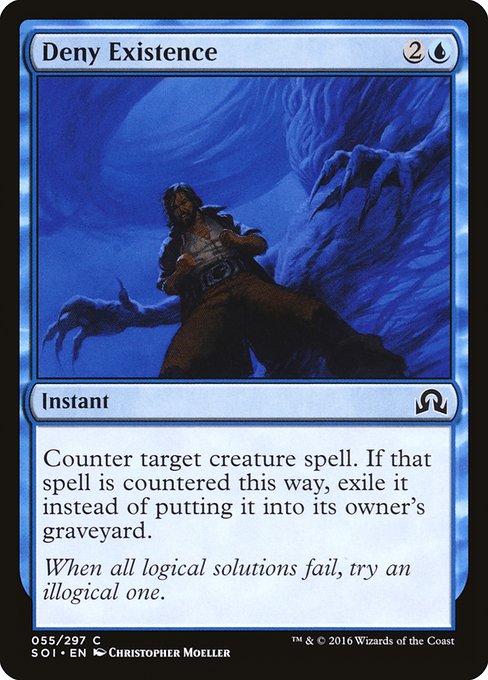
Image courtesy of Scryfall.com
Deny Existence and the Planeswalker Playground
Blue control has always loved to play a game of chess with the battlefield, and Deny Existence is a nimble little piece that reminds us why tempo matters in a Planeswalker-centric game plan. For a modest mana cost of 2U, this instant from Shadows over Innistrad stages a very specific, very satisfying interaction: counter a target creature spell, and if you do, that creature spell is exiled instead of going to the graveyard. It’s the kind of card that looks simple on the surface but rewards careful calculation around planeswalkers, creature threats, and graveyard-reliant synergies. 🧙🔥💎
In many formats, Planeswalkers occupy a central strategic lane: they generate advantage over time, they shape how the game goes long, and they demand answers that aren’t always obvious. Deny Existence doesn’t directly counter planeswalker spells—remember, it targets creature spells only. That limitation is both a design feature and a tactical puzzle: the card teaches you to read the board, identify the real threats to your walkers, and pace your responses so that your planeswalkers can flip or ultimate at the right moment. The flavor line from the Shadows over Innistrad era—“When all logical solutions fail, try an illogical one”—also feels like a wink to blue’s penchant for clever detours around a hostile board. ⚔️🎨
Three ways Deny Existence shapes planeswalker-focused games
- Strategic protection of transforming planeswalkers: Jace, Unraveler of Secrets, and other Innistrad-era walkers are built around layers of defense and incremental advantage. If your opponent tries to pressure a planeswalker with a creature spell that would threaten your board state or remove a critical blocker, Deny Existence offers a tempo-based answer. By countering the creature spell, you deny the immediate threat and exile it, removing a potential graveyard-recycling engine from the equation. The result? Your walker can stay active a turn longer, which is often the difference between flipping to the powerful backside or sitting at a fragile one or two loyalty. 🧙♀️
- Graveyard tactics and exile value: The exile clause matters more than it looks. In formats where graveyard strategies run rampant—think decks that fetch, recur, or reanimate—removing the spell from the graveyard can blunt wicked late-game plans. If an opponent hoped to bring back a creature via Unearth or to fuel a delve engine off the back of a countered spell, the exile clause denies that resurrection path and keeps your planeswalker safer in the meantime. That subtle shift is precisely the kind of micro-advantage blue decks chase when planeswalkers are the real prize on the table. 💎
- Tempo and planewalker-based win conditions: A well-timed Deny Existence can swing the tempo in a way that supports a planeswalker-centric plan. By neutralizing a single creature spell, you slow down the board, draw the game into a position where your walker’s loyalty-boosting abilities—whether they sculpt the top of the library, generate card advantage, or threaten a decisive ultimate—land with more impact. The card’s color identity and low mana cost make it a natural fit in tempo or UW control shells that lean on walkers as as a long-game finisher. 🧲
“When all logical solutions fail, try an illogical one.” That sentiment echoes through every well-timed denial—especially when your planeswalkers start to glow with potential and your opponent’s board stalls mid-chess move.
Flavor, design, and the practical side of a blue staple
The Shadows over Innistrad era is a gorgeous mashup of gothic dread and clever spellwork, and Deny Existence sits neatly in that vibe. The art by Christopher Moeller captures a moment of focused misdirection, the kind of scene you’d expect when a quick counterspell interrupts a creature’s ritual in mid-cast. The card’s rarity as common in a set that often feels rarefied at the top of the power curve makes it a practical pickup for budget blue-control builds. Its CMC of 3 keeps it in reach for early- to mid-game play, and its legalities list includes formats where players love to tinker with legacy, modern, and a wide swath of eternal formats. In decks built around planeswalker resilience, Deny Existence adds a reliable piece to the toolkit, one that rewards careful timing and good knowledge of what your opponent is trying to do with their walkers. ⚔️🎲
From a collector’s lens, Deny Existence is a solid, approachable piece. It trades at a modest price point while offering real strategic value in the right shells. And while it’s not the headline centerpiece of a modern control deck, its ability to tilt the tempo—especially in a meta that features heavy creature presence around planeswalkers—helps justify slotting it into a midrange or control build. The synergy is not flashy, but it’s sturdy: a little blue tutor’s wisdom woven into the fragile, spell-slinging life of a planeswalker-focused plan. 🧙♂️
Deck-building take and a quick look at the modern landscape
In practical terms, Deny Existence shines in decks that lean on strong early plays, efficient countermagic, and a couple of finishers that profit from a stable board. Think UW tempo or a more traditional blue control shell that wants to protect a transforming planeswalker or a final-emergency bomb spell. It’s also a nice inclusion in cube environments that want a reliable, low-odor counterspell with a useful exile clause. The modern meta has room for these kinds of precise answers, especially when opponents try to deploy a big planeswalker while you’re still brewing up answers. 🧙🔥
For players who like to pair their MTG hobby with a little real-world desk gear, you can keep your battlegrounds tidy and ready for action with a top-tier mouse pad that matches the precision of your plays. The Rectangular Gaming Mouse Pad Non-Slip Rubber Base 1/16 inch Thick is a solid companion for long drafting sessions or late-night grind sessions, giving you a steady surface as you plan your next illogical move. Click the button below to grab it and set the stage for your next deckbuilding session.